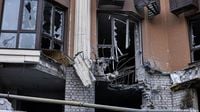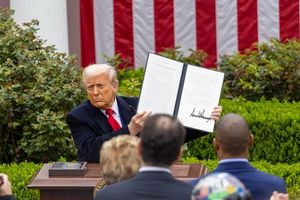A three-day ceasefire declared by Russia began early Thursday, May 8, 2025, as the country prepares to commemorate the 80th anniversary of the defeat of Nazi Germany. The ceasefire started at midnight Moscow time (21:00 GMT on Wednesday) but was quickly overshadowed by renewed violence, as Ukraine reported fresh Russian bombings in the Sumy region shortly after the truce took effect.
According to Ukraine's Air Force, Russian aircraft launched guided bombs over Sumy, a northern region of Ukraine, within hours of the ceasefire's declaration. This act raised immediate concerns about the sincerity of the truce, which had been unilaterally declared by Russian President Vladimir Putin. Despite the ceasefire, there were no immediate reports of casualties or damage from the attacks.
Ukraine has not committed to the ceasefire, instead proposing a 30-day cessation in fighting, which President Volodymyr Zelenskyy reiterated in his nightly address. Zelenskyy described the ceasefire as a "theatrical performance" and emphasized that Ukraine would not be creating a pleasant atmosphere for Putin's exit from international isolation during the upcoming Victory Day celebrations.
Amid the backdrop of the ceasefire, significant diplomatic activities are unfolding. Chinese President Xi Jinping arrived in Moscow on Wednesday for a four-day visit, coinciding with the military parade on May 9. His discussions with Putin are expected to focus on a second gas pipeline to China and broader global issues, including the ongoing war in Ukraine and U.S.-Russia relations. Several agreements between the two nations are anticipated to be signed during Xi's visit.
As the ceasefire commenced, the situation in Ukraine remained tense. On the same day, Ukrainian drones targeted Moscow for the second consecutive night, leading to the temporary closure of 13 airports, including four in Moscow. This heightened security response underscores the ongoing conflict, as Russian authorities scrambled to manage the fallout from the drone attacks.
Ukrainian officials have previously stated they cannot be held responsible for events occurring within Russian territory due to the ongoing war. The escalation of drone activity in Russia has raised eyebrows, especially with high-profile leaders from countries friendly to Russia set to attend the Victory Day parade. Among those on the guest list are Brazil’s President Luiz Inacio Lula da Silva and Vietnam’s President To Lam.
Russia's Ministry of Foreign Affairs spokeswoman Maria Zakharova claimed that Moscow has never opposed a ceasefire, attempting to shift the narrative around the ongoing conflict. However, U.S. Vice President JD Vance remarked during the Munich Security Conference that Russia is "asking for too much" in its initial peace deal proposals, highlighting the complexities of the ongoing negotiations.
Amid these developments, Ukraine's Central Bank governor, Andriy Pyshnyy, revealed that Kyiv is considering a shift away from the U.S. dollar as its reference currency. This potential transition is influenced by anticipated accession to the European Union and the possibility of global trade fragmentation, signaling a significant economic pivot for Ukraine.
As the three-day ceasefire unfolds, the international community watches closely. The ceasefire aligns with Russia's Victory Day celebrations, an event often utilized by the Kremlin to promote its narrative surrounding the war in Ukraine. The military parade, expected to be attended by several world leaders, serves as a platform for Putin to project strength while facing increasing isolation on the global stage.
While the ceasefire is officially in place, the reality on the ground suggests that hostilities may continue. The Ukrainian government remains skeptical of Russia's intentions, with Zelenskyy emphasizing that any proposal for peace must be genuine and not merely a tactic to gain international favor.
As the situation develops, both sides remain entrenched in their positions, with Ukraine insisting on a longer-term ceasefire while Russia's short-term truce raises questions about the future of peace negotiations. The dynamics of this conflict continue to evolve, with the potential for further escalations looming as both nations navigate the complexities of war, diplomacy, and international relations.
In summary, the ceasefire declared by Russia has been marred by immediate violations, raising doubts about its effectiveness and sincerity. As Ukraine pushes for a more extended cessation of hostilities, the involvement of global leaders like Xi Jinping adds another layer of complexity to an already intricate geopolitical landscape.




